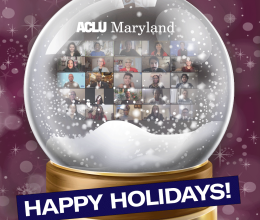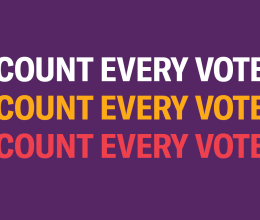
MEDIA RELEASE
ACLU Responds to Maryland Division of Corrections' Revision of
Invasive Social Media Policy
FOR IMMEDIATE RELEASE
April 6, 2011
CONTACT: Meredith Curtis, ACLU of Maryland, 410-889-8555; media@aclu-md.org
BALTIMORE - Today, the Maryland Department of Corrections released a letter describing a revised social media policy, in response to a complaint from the American Civil Liberties Union of Maryland asking DOC to rescind their blanket policy demanding personal social media passwords from corrections officers and applicants as part of the employment certification process.
The ACLU's January 25 letter to Public Safety Secretary Gary Maynard details the experience of Officer Robert Collins, who was ordered to supply his Facebook login information during a recertification jnterview - giving the DOC access to his private electronic communications, and leaving his friends vulnerable to governmental cyber-snooping.
The DOC has not yet provided the written policy itself, although the ACLU has requested a copy.
The following can be attributed to Deborah Jeon, Legal Director for the ACLU of Maryland:
"The government should not ask people to "volunteer" access to their private, personal communications. If the term "chilling effect" describes anything, it describes this. Few job applicants, eager to please a prospective employer, are going to feel genuinely free to decline to give up their information. Under the DOC's reasoning, it would be equally permissible (and logical) for them to ask that job applicants volunteer to have the DOC monitor all of their calls, read all of their e-mail, look at all of their letters, and search their houses on demand. The fact that no employer in country would think of "asking" that strongly indicates how improper it is, and how improper this is.
Although the government promises not to refuse to hire someone because the applicant does not turn over their password, it will be virtually impossible for an applicant who suspects the government is not living up to its word to prove that. Moreover, if the policy is truly voluntary, and if it is true that no negative inferences will be drawn, then it serves no useful purpose.
Equally significant, the DOC's revised policy does not address the privacy rights of the Facebook "friends" of those who apply for positions and agree to grant the government access to their social media sites, whose privacy rights are invaded by the government without their consent.
In a separate press statement regarding the policy change, the DOC claims that, according to their own figures, 94 percent of those hired by the DOC during the past year shared their social media information, thus making the case that many - like Robert Collins - felt compelled to supply this information. Presumably, the seven people who provided the information and were not hired also did not feel free to refuse. The DOC statement leaves it unclear whether anyone actually refused, since they say five of those hired "chose not to, or were unable to" supply their login information. Another significant omission from the DOC press statement is how many of those who were not hired declined to provide the DOC with social media information. Yet, to fairly determine whether refusal to share the information had any negative impact on hiring, it is imperative that the government look not only at the responses of those who were hired, but also at how many of the 2,689 applicants who were not hired refused to provide social media information.
###







